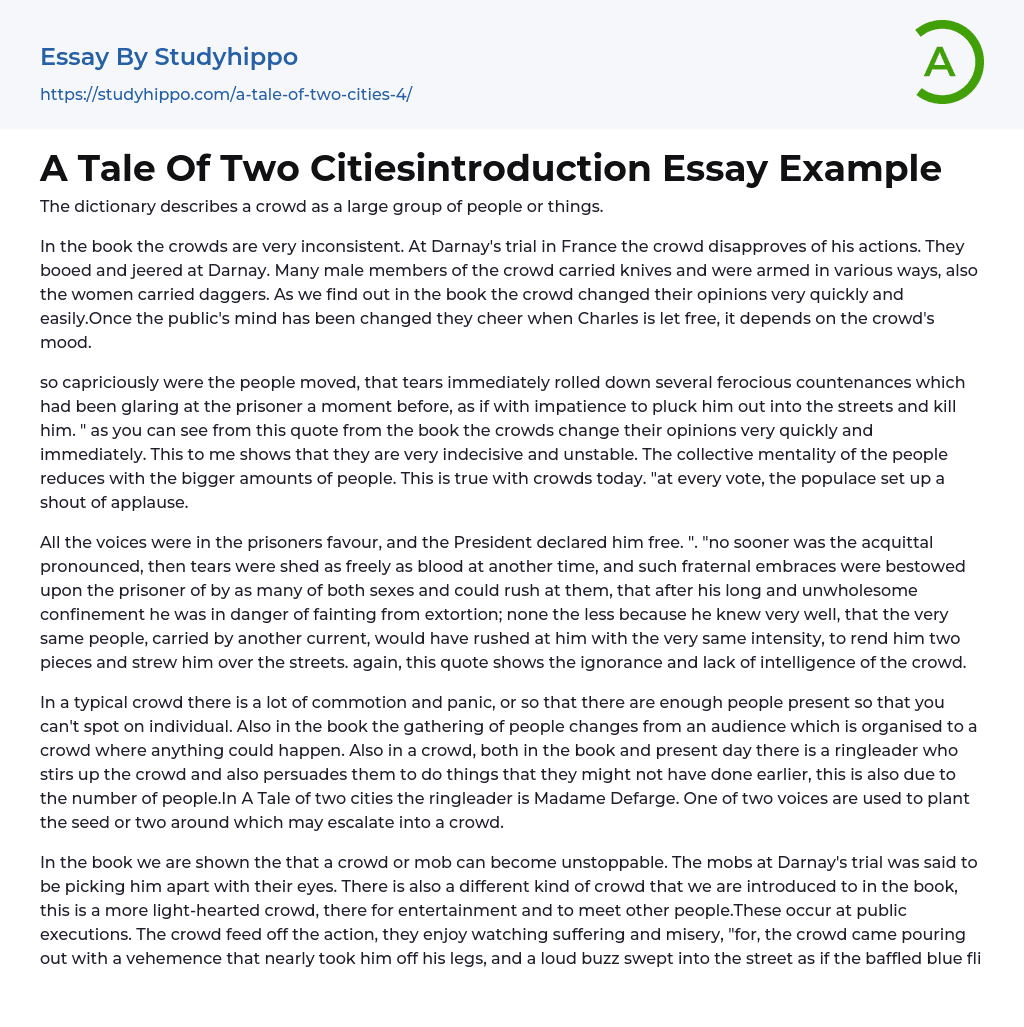According to the dictionary, a crowd consists of a large gathering of individuals or objects.
In the book, the crowds exhibit a great deal of inconsistency. During Darnay's trial in France, the crowd expressed their disapproval by booing and jeering at him. Additionally, many male members of this crowd were carrying knives and other weapons, whereas the women were carrying daggers. As the book progresses, we discover that the opinions of this crowd can change rather easily and quickly. Depending on their mood and perspective, the same crowd would later cheer when Charles is ultimately released.
The quote from the book demonstrates how quickly the crowd's opinions can change, with tears instantly streaming down the faces of formerly fierce individuals who had been glaring at the prisoner just a moment before, seeming eager to drag him out into the streets
...and murder him. This indicates that they are fickle and unstable in their thinking, with their group mentality diminishing as their numbers increase, a phenomenon that remains true in contemporary crowds. The people erupted in cheers during every vote.
Upon the President's acquittal, the prisoner was released thanks to unanimous support from all voices present. The news sparked emotional reactions including tears and embraces from both genders. Having been held in unsanitary conditions for a prolonged period of time, the prisoner was on the verge of collapsing due to exhaustion. He acknowledged that this same group could easily turn against him with equal intensity and violence, demonstrating their ignorance and lack of intellect.
Amidst a crowd, there is often chaos and fear as it becomes challenging to distinguish individuals. In the novel "A Tale of Two Cities,
the gathering transitions from an organized audience to an unpredictable and potentially perilous mob. A ringleader, who incites actions that may not have been considered otherwise, typically leads such crowds due to the vast number of people present. Madame Defarge serves as the ringleader in "A Tale of Two Cities." Usually, one or more voices contribute ideas that can escalate into a complete crowd mentality in current situations and within literature.
The book illustrates the power of a crowd or mob, as evidenced by the unstoppable behavior of those at Darnay's trial who were said to be picking him apart with their eyes. Alternatively, the book also introduces a more lighthearted crowd, present for entertainment and to socialize with others. These types of crowds often gather at public executions, where they become caught up in the action and relish in observing suffering and misery. A telling example of this occurs when "the crowd came pouring out with a vehemence that nearly took him off his legs, and a loud buzz swept into the street as if the baffled blue flies were dispersing in search of other carrion" - a testament to the immense power possessed by such groups.
The book portrays crowds as a parasite on others' suffering and capable of committing violence, turning them into a mob. However, there is a light-hearted crowd outside the wine shop who dances and sings together. The power of the crowd is exemplified at the Old Bailey where it is described as unstoppable like a sea or wind. One person's shout causes an uproar in the turbulent crowd. The revolution that follows scatters all laws, forms, and ceremonies to
the winds. At the end of the book, when the execution takes place, Dickens does not mention much about the crowd.
In my opinion, the reason for his actions is to preserve the significance of the moment without interference from the loud crowds. The crowds in A Tale of Two Cities play a significant role in various outcomes, including the Revolution. They have the power to sway a judge's ruling, as opposing them could lead to death during their raging state. The book reveals that numerical strength can bring about a difference, whilst one voice, such as Madame Defarge's, can motivate them to perform undesired acts.
The revolutionary mob is a daunting force that is unafraid and persistent in achieving their objectives, even if it means turning on their allies. Throughout the book, crowds play a significant role in shaping events. Madame Defarge is particularly skilled at inciting bloodlust and ruthlessness in the mob due to her persuasive power and shared beliefs. Without these influential crowds, the novel would lack the vitality and unpredictability that make it compelling.
- 1984 essays
- A Farewell to Arms essays
- A Good Man Is Hard to Find essays
- A Hanging essays
- A Lesson Before Dying essays
- A Long Way Gone essays
- A Rose For Emily essays
- A Separate Peace essays
- A Tale Of Two Cities essays
- A Very Old Man With Enormous Wings essays
- Adventures Of Huckleberry Finn essays
- Alice in Wonderland essays
- All Quiet on The Western Front essays
- Allegory of the Cave essays
- An occurrence at owl creek bridge essays
- Animal Farm essays
- Anthem essays
- Antigone essays
- Arthur Conan Doyle essays
- As I Lay Dying essays
- Atticus Finch essays
- Barn Burning essays
- Battle Royal essays
- Beauty and The Beast essays
- Beloved essays
- Boo Radley essays
- Brave New World essays
- Candide essays
- Castle essays
- Characters In Hamlet essays
- Characters In Romeo And Juliet essays
- Christmas carol essays
- Chronicle of a Death Foretold essays
- Cinderella essays
- Crime and Punishment essays
- Daisy Miller essays
- Death of a Salesman American Dream essays
- Desdemona essays
- Diary Of A Wimpy Kid essays
- Dracula essays
- Dubliners essays
- Emma essays
- Ender'S Game essays
- Ethan Frome essays
- Eveline essays
- Fahrenheit 451 essays
- First-Person Narrative essays
- Fish Cheeks essays
- Frankenstein essays
- Genesis essays




